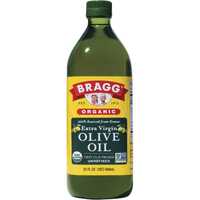Olive oil is one of the most popular cooking ingredients in the entire world. Whether you're frying vegetables, cooking meats, or making a salad, it makes a nutritious and delicious addition to almost any recipe. Olive oil can also be found in many cleaning and cosmetic products, and it was once used to fuel traditional oil lamps.
Despite its amazing properties and numerous applications — at its core — olive oil is a basic liquid fat produced in a very simple way. Olives are cleaned before being crushed in a mechanical mill, with the oil separating from surrounding solids and water with minimal heat or chemical treatments.
Let's take a detailed look at one of the world's favourite oil products. While it's a standard on every kitchen shelf, and it's often taken for granted, olive oil has a rich history and offers a range of fantastic health benefits.
What is Olive Oil?
Olive oil is the 'milk' of the olive, which is the fruit of the olive plant or Olea europaea. These small trees are widely associated with the Mediterranean Basin, but they now grow happily all over the world. From traditional roots in Europe to new homes in South America, Australia, and New Zealand, this prolific shrub is loved the world over. The olive tree has long been a symbol of peace between nations, and olive oil brings distinct flavours and textures together in a similar fashion.
The composition of olive oil varies significantly between places, with the shrub type, growing altitude, time of harvest, and extraction technique all influential. There are also similarities between plants, however, with all olive oil products featuring certain fatty acids. For example, all olive oil samples include up to 83% oleic acid, up to 21% linoleic acid, and up to 20% palmitic acid. The phenolic content of olive oil is responsible for its bitter and somewhat pungent taste, with up to 30 phenolic compounds including elenolic acid, alpha-tocopherol, flavonoids, lignans, and pinoresinol.
Types of Olive Oil
While there is a single olive tree, not all olive oil products are the same. Depending on how they're categorised, there are between three and five types of olive oil on the market. Regardless of which one you choose, however, they all share advantages compared with other popular cooking oils. All olive oils have a great taste and aroma, they're all extracted and refined naturally, and they all share a unique and rather impressive nutritional profile.
The three primary categories of olive oil include:
Standard olive oil
Regular olive oil is found in every supermarket and health food store. It's a combination of refined olive oil and virgin olive oil, with the latter typically making up 15%-25% of the mixture. While the refined oil component is treated with some heat and chemicals to remove flavor defects, it's normally at a much lower rate than other vegetable oils. Standard olive oil is noticeably lighter than extra virgin olive oil, and it also has a more neutral flavor and aroma.
Extra virgin olive oil
Extra virgin olive oil is the ultimate in terms of its flavor and health benefits. It’s made solely via mechanical methods, which means it avoids high heat and chemicals throughout processing. Being unrefined and cold-extracted, it has higher levels of many bioactive compounds, including oleuropein, hydroxytyrosol, and oleocanthal. Extra virgin olive oil is produced with subjectively favourable flavor characteristics, with early harvest oils typically featuring a bold and peppery flavor.
Virgin olive oil
Virgin olive oils are often confused with extra virgin products, and unlike the latter, they're actually pretty rare. You probably won't find virgin olive oil at your local grocery store, so you need to visit certain health food stores or olive oil specialists. This oil is extracted naturally and left completely unrefined, but it does feature differences in taste when compared with standard or extra virgin oils. Virgin olive oil has a mild taste with subtle natural flavours and aromas.
Along with these three basic categories, there are also:
Refined olive oil
This type of olive oil is extracted solely from black and ripe olive fruits. It has the least amount of virgin olive oil among all varieties, which means you may miss out on some of the health benefits. However, refined olive oil still makes a great cooking oil.
Olive pomace oil
At the bottom of the olive oil ladder you'll find the pomace type. It's extracted from olive residue, which features lots of water and is fairly low quality. While you can improve pomace oil by adding extra virgin oil, it's mostly used for commercial high-heat cooking.
A Short History of Olive Oil
Despite a long association with the Mediterranean, the olive tree likely came from ancient Persia and Mesopotamia. It then spread to North Africa and the Levant, and by as early as the 28th century BC, it had reached Greece and Libya. Olive trees have grown in the Mediterranean since the 8th millennium BC, and since the beginning, they've played an important religious and social role among European civilizations. The olive tree played a central role in Greek mythology and culture, and the Spartans even used to rub themselves in the oil while exercising.
The Roman Empire pushed olive trees and their oil into new territories. The commercial importance of olive oil aided the Roman conquest of Egypt, Greece, and Asia Minor; and it led to new trade opportunities in Spain and across the Mediterranean. As the sea-faring cultures of Portugal and Spain spread their sphere of influence around the world, olive production was slowly introduced into Peru, Argentina, and beyond. Places like Mexico and California enjoyed a similar climate to the Mediterranean, as olive trees flourished and new people were introduced to this wonderful oil.
In the modern world, olive oil production is at a record high. 3.2 million metric tons of olive oil were produced in 2019-20, with Spain the largest producer followed by Italy, Tunisia, Greece, Türkiye, and Morocco. San Marino has by far the largest per capita consumption of olive oil worldwide, followed by Greece, Spain, Italy, Portugal, and Israel. While Northern Europe, North America, the Pacific, and Asia consume far less olive oil than Mediterranean nations, consumption is growing all the time.
The Nutritional Profile of Olive Oil
Olive oil is a healthy natural oil with a rich and diverse nutritional profile. It's a great source of antioxidants, a fantastic source of healthy fats, and it also has lots of vitamins for heart health.
Olive oil has the following nutritional profile, measured per 100 grams and DV (daily value):
- Calories: 884
- Saturated fat: 13.8 g or 14% of total calories
- Monounsaturated fat: 73 g or 73% of total calories
- Polyunsaturated fat: 10.5 g or 11% of total calories
- Vitamin E: 14 g or 13% of DV
- Vitamin K: 60 µg or 7% of DV
Health Benefits of Olive Oil
Over the last few decades, the Mediterranean diet has received lots of good publicity. It has been associated with the prevention of degenerative diseases in several studies, and linked with extended longevity across a broad population range. While there are various reasons this diet is so healthy, olive oil has a huge role to play. Olive oil is the exclusive or nearly-exclusive dietary fat in many Mediterranean cultures, and it's one of the unifying culinary influences of the entire Mediterranean area.
The following advantages attributed to olive oil are beneficial on numerous health fronts:
Improved heart health
Cardiovascular diseases are the leading contributor of death in the western world. Along with obesity and smoking, high blood pressure is one of the three biggest risk factors associated with these diseases. According to studies, a diet rich in olive oil leads to a decrease in blood pressure and associated conditions, including things like heart disease, stroke, heart failure, and peripheral arterial disease. Olive oil protects against heart disease on numerous fronts; reducing inflammation, preventing oxidative damage, improving blood vessel health, managing blood clotting, and lowering blood pressure.
Reduced inflammation
Along with heart health, olive oil has a direct impact fighting inflammation. Chronic inflammation is thought to be a leading factor in many diseases, from heart disease and diabetes to metabolic syndrome and arthritis. The anti-inflammatory properties of olive oil are partly due to oleic acid, along with antioxidants like oleacein and oleocanthal.
People living in Mediterranean countries have a lower risk of many diseases than surrounding European nations, and their consumption of olive oil and other anti-inflammatory foods is thought to be responsible. These anti-inflammatory effects may even work against cancer, with the phenols in olive oil possibly impairing the proliferation of damaged and premalignant cells.
If you want to consume more healthy olive oil in your diet, Healthy Being has everything you need. We have organic extra virgin olive oil in multiple sizes, healthy olive oil snacks, and natural cosmetic products enriched with this amazing substance. So check out our website today and enjoy free shipping options across Australia and worldwide delivery!


 Certified Organic
Certified Organic Vegan Friendly
Vegan Friendly  Vegetarian
Vegetarian Organic Ingredients
Organic Ingredients Dairy Free
Dairy Free Gluten Free
Gluten Free Keto Friendly
Keto Friendly
































